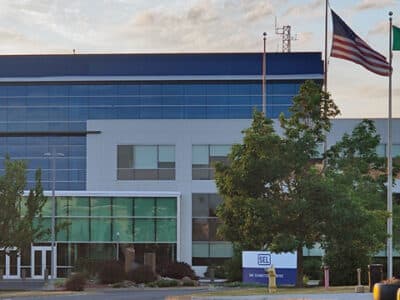We’ve focused a lot this summer on our 40th anniversary, where we are today and where we’re headed. It’s time we step back and talk about how ECT began, it’s initial goals and purpose.
Back in the late 1970s/early 1980s, Larry Fisher was in electrical management at a large company with a headquarters in town. At one point during an electrical audit, he began answering questions about how long machines are running and whether or not energy-efficiency is a priority. While walking through the 35-acres of buildings, Larry began to understand how critical energy conservation was becoming. At some point in 1981 that company moved out of Louisville leaving Larry and his wife, Kathy, with an opportunity.
He felt energy conservation was the direction in which he was headed and felt he could make a difference. Using his knowledge of electrical engineering, Larry and Kathy began the new business, Energy Conservation Techniques, in their living room. They had a card table, a couple of chairs and a phone. Eventually they purchased a (pre-Microsoft) computer to get things organized.
They took out an ad in a magazine called Kentuckiana Purchaser and from there a mentor of his approached him to get more information as he was also interested in energy conversation and his expertise was in the HVAC industry. The company was at the forefront of utilizing electronic controls and their competition was made up of much larger companies. One of their first customers said to Larry, “I’m going to go with you because I know where I can find you.” And that was when Larry knew he was really onto something and that it wasn’t just about the technology they were using, it was about the relationships they were building. Larger companies had turnover, and consistency in relationships was harder to build.
ECT still has a relationship with that company.
“We knew we had to develop great relationships with customers and we did – they believed in us because we did what we said we were going to do. They knew any issue they had they could call me directly. You just don’t get that kind of access with a large company,” Larry said.
For those first few years, Larry would go out as salesman, installer, serviceman, building the business and building relationships. The business, in general, kept evolving and after about eight years, most systems switched to electronic controls. ECT then began using Tridium for its customers, an integration product. This would allow several different systems to work together on one platform. This is still a flagship product of ECT today.
I asked Larry how they got into the security side of the business and his response was that a customer (a hospital with multiple facilities) asked ECT why they hadn’t gotten into the security side. That customer felt their current vendor made them feel like they were getting “ripped off.” He went on to say to Larry, “it’s just wires, afterall.” At that point, Larry did his research and began offering Lenel, a security product, to customers. Lenel is still one of the company’s premiere products. The customer didn’t have ECT bid on the security work – they had that level of trust with ECT that the team went right in with design, installation, programming and training. The security division has continued to grow.
At the beginning, Larry and Kathy hired two people they knew from their old company who really helped get the business off the ground. As with many startups, juggling homelife and worklife (they had three young children at home) began to be cumbersome so they found some space on Bardstown Road, near their home. They referred to that office as the “broom closet.” They kept expanding and eventually purchased the building they are in now.
I asked Kathy and Larry when they knew it was time to sell. His first reaction was “When you’re a business owner you work a lot of hours. When it came to Friday, I was happy because I only had two more days to work that week.” True enough.
At age 60, Larry lost his younger sister and it gave both Kathy and Larry a reason to discuss “how much is enough.” The numbers were right, the company was in a great position, so they began to draft a succession plan. They were approached by several large companies with great financial offers, but there wasn’t an assurance that ECT’s people would be taken care of in the way Larry and Kathy had always done. They decided to pick their own successors.
They knew Jeff Murphy through the industry as well as Dave Stumler. They first approached Jeff and asked him to come on board, if it worked out they’d sell to him. In their words, Jeff had been at a larger company and had great qualifications but he wasn’t getting the opportunity to use his entrepreneurial skills. They felt ECT would fulfill that need, and they were confident Jeff had the same philosophy as they did about their team.
“It’s the people that make a company,” Larry said, “not its owners.”
“David took a little work to bring on board.” Kathy said and she said she feels very fortunate that he moved from Nashville to be part of the ECT Team. According to Larry, Kathy worked hard to put Dave in place before they retired.
And retire they did. Together, Larry and Kathy are in their forty-eighth year of marriage, and are enjoying their three kids and two grandchildren. Larry says “we live together, we worked together, and we’re still together.”
Today they enjoy traveling, hiking, biking and playing pickleball. Larry plays golf and they both visit Kathy’s 97-year-old father in California whenever they can. Larry still helps out his friends and neighbors with their electrical issues.
So what’s their legacy?
Back in the 1970s, Larry and Kathy were living in California (he was in the Navy) and they remember seeing the gas lines. They started thinking about being forward-thinking on energy usage. ECT allowed them to help companies save money and energy, which helped the environment and provided good jobs. They feel they afforded good people to have good jobs.
“Larry’s a smart electrician,” Kathy says. “He’s got business savvy and can talk to anybody about anything. He really just told people what would make sense and was good at what he did,” and that’s what helped him sell time after time. She says they still focus on what they can get rid of so that they can “save more of what this great earth gives us.”
Larry ended the conversation talking about looking back on the business. “When you’re running a business, especially when you’re building it from scratch, you just do the things you have to do. You don’t even realize you’re growing because you’re so focused on the business, itself. Now I look back and can say ‘wow, we really built something.’ You just don’t notice it when you’re doing it.”
Finally, they both touched on pride of the team carrying the company forward. “They took the foundation and have built upon it. We’re just really proud of those guys.”



